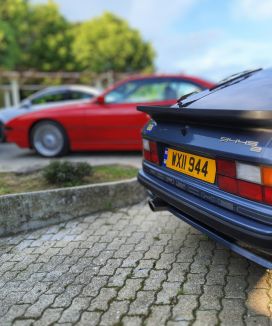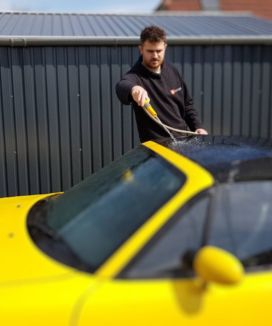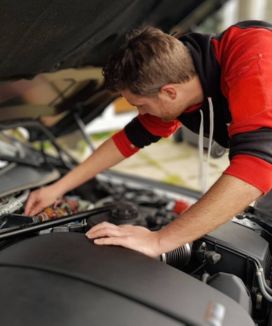Why Does My Car Squeak When I Brake?
Table of Contents
Table of Contents
If your car squeaks when you brake, then you’re probably both worried and extremely annoyed every time you drive.
The high-pitched scream every time you tap the pedal is not only embarrassing, annoying and a headache generator, but could also be a cause for concern.
So, why does your car squeak when you brake?
The most common reason a car squeaks under braking is due to worn brake pads, but other, less concerning reasons include stuck debris, carrying heavy loads, and cold weather. If the brake pads are the cause, they will need to be replaced.
In this article, we’ll look at the top reasons your car’s brakes are squeaking, as well as how to fix them.
Top reasons your car’s brakes are squeaking
There are a multitude of reasons as to why your car’s brakes are squeaking. Some are easier to fix than others, and some should be more of a concern. Here are the top reasons:
Heavy Loads
You may notice that your car’s brakes squeak more on family holidays, when you have more passengers than usual or even when you’re carrying heavy shopping.
This is because as your car carries more weight, the brakes have to work harder to slow the car down and eventually stop it.
The harder the brakes work, the hotter they’ll get, which can cause the metal to swell, causing the dreaded squeaking noise.
You may need to get your brakes checked out more often if you’re regularly carrying heavy loads, just to be safe.
Weather
Snow, ice, and even just cold weather in general can cause your brakes to squeak.
This is because when it’s cold, moisture clinging to the components of your brakes can freeze if the car isn’t in use. When you first set off in the morning, it may take a few brake cycles to clear the layer of moisture.
This is nothing to worry about, and it’s common for a thin layer of rust to build up if the car hasn’t been in use for some time. Once the brakes warm up, the moisture will disappear.
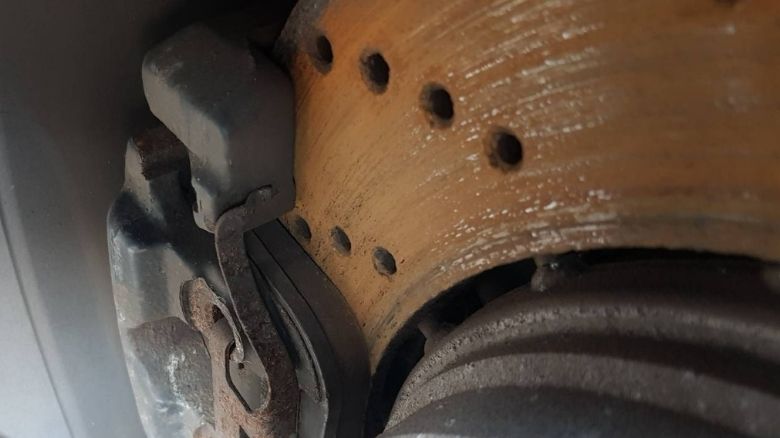
Worn brake pads
The most common reason for your brakes to squeak when you drive is worn brake pads. Brake pads wear over time – whenever you press the brake pedal, you’re essentially causing two pieces of metal to squeeze together.
Over time, this is going to thin the brake pad out, which can end up causing a terrible squeaking sound whenever you go near the brake pedal.
The best thing to do in this situation is have your brake pads replaced. Driving with worn brake pads is nothing short of dangerous as your braking won’t be as efficient.
So, get them checked by a mechanic as soon as possible, and replace them before you head out on your next long journey.
Road Materials in the brakes
Every time you drive, there’s a small chance that little objects, such as sand or grit will fly up and embed itself in your brakes. This is perfectly normal, and you won’t even notice it most of the time.
However, on occasions, a bigger stone or piece of grit will get stuck in your brakes. This will cause a squeaking noise as you’ll be able to hear the stone being squeezed onto the brake pad.
This issue will usually resolve itself, but it may need to be removed manually if it persists.
Calipers are sticking
Another reason as to why your car’s brakes may be squeaking is because the calipers are sticking. This usually happens due to inadequate lubrication that causes the pistons to not retract fully.
This can cause your brakes to squeal when braking, but can also make them noisy when driving along normally.
A sticky caliper can often be resolved by adding lubrication, but may occasionally need to be replaced.
Our BMW 3 Series suffered with this issue, and after a number of attempts to lubricate, the caliper eventually had to be replaced.
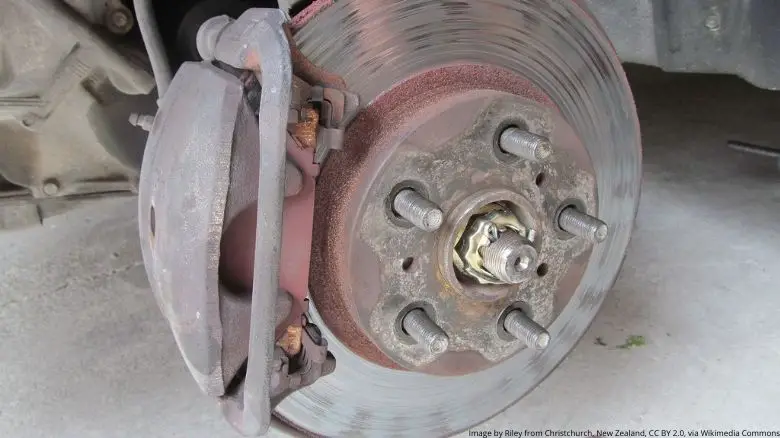
Is it bad to drive with squeaky brakes?
It’s bad to drive with squeaky brakes if the brake pads are worn, as your stopping power is severely reduced. This can be extremely dangerous, and even cause a crash.
The answer to this question is entirely dependant on the cause of your squeaky brakes.
If it is a minor cause, like a stone in the brake pad, or a heavy load, then there should be no long-lasting issue as it’s likely to resolve itself in time.
However, if the cause of your squeaky brakes is because the brake pads are sufficiently worn then you should not drive anywhere until they have been replaced. Worn brake pads simply won’t give you enough stopping power.
Imagine this – your brakes have been squeaking for around a week now. You’re on a country road, a deer jumps out, and your car simply cannot stop in time as the pads are worn down to bare metal. Driving with worn brake pads can be dangerous, and even fatal.
Because it can be hard to decipher the cause of your squeaky brake pads, it’s best to have them checked by a mechanic whenever the issue arises. It’s the safest option, and well worth the money that you spend.
How do I get my brakes to stop squeaking?
There are several methods that you can try to get your brakes to stop squeaking. Here are the two best methods:
Use Grease
If you’ve got a new car or have just had a new set of brakes fitted, you should be able to stop brake squeaking pretty easily. Simply add some grease to the contact points of the brakes as lubrication.
You’ll have to disassemble the brakes to do this, but this can actually be much easier than it sounds if you have some basic car DIY knowledge.
Then grease up the relevant areas, reassemble the brakes, and you should find that the squeaking noise goes away.
Be very careful where you apply the grease, as it can cause serious damage if it’s applied incorrectly. The following video shows how to correctly apply grease to your car’s brakes:
Buy a set of shims
Shims are great if your car brakes are squeaking because they are loose. They work by preventing the rotors and pads from rattling against each other under normal operation.
They also help to absorb vibrations, further reducing the squeaking noise. Most modern braking systems are already fitted with shims, but if yours isn’t, this can be a great way to reduce the squeaking noise coming from your brakes.
Replace the pads and/or rotors
If your brakes are sufficiently worn, it may be time to replace them. While this can be seen as an expensive option, unfortunately it is necessary every so often.
Brakes are wear parts, and as such do not last forever. As they wear down, the chances of your brakes squeaking and squealing increase.
It’s advisable to get a trained mechanic to do this unless you really know what you’re doing, as any mistakes can be costly. Not only to your wallet, but also to your safety.
How much does it cost to fix squeaky brakes?
Replacing brake pads to fix squeaky brakes costs between $150 and $250 per axle, but this cost increases to at least $250 per axle if replacement rotors are needed as well.
The actual price you pay will depend on your car itself, the cause of the squeaky brakes, and which components need replacing.
For instance, if your car’s squeaky brakes are because of some debris wedged against the brake pad, you may only need to pay the mechanic’s labor charge to remove it, rather than purchasing any parts.
But, if components in your braking system are worn then you can expect to pay several hundred dollars per axle. Sports cars, luxury cars, and heavier vehicles are all likely to have bigger brakes and therefore cost more to fix.
Pads are relatively cheap to replace, but the cost can increase rapidly if rotors and calipers are needed. Thankfully brake rotors do not wear out as quickly as pads, and calipers can last a very long time.
It may seem like a lot of money to replace these components, but it will ensure your safety, and help to maintain the longevity of your vehicle.
Final thoughts
So, there is everything you need to know about squeaky brake pads. Your squeaky brakes may be because of factors like weather, grit, or a heavy load, which is perfectly normal and usually not a concern.
However, if your squeaky brakes are due to them being sufficiently worn, you’ll need to get them fixed immediately.
Brakes are a vital part of your car, so make sure you look after them!
ABOUT THE AUTHOR
Adam Chinn writes about the intersecting worlds of classic cars, driving pleasure, and smart investment strategies. Starting his journey at 26, he’s proven that one doesn’t need to be wealthy to begin investing in classic cars.
Adam’s insights have been recognized on platforms such as MoneyInc, Swagger Magazine, and Top Speed.

